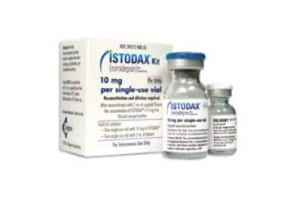
A cancer drug sold by Celgene could be used to drive HIV from hidden reservoirs within the body so the virus becomes susceptible to antiretroviral therapy, according to a new study.
The results of a small study in six HIV-positive patients – reported at the Aids 2014 congress in Melbourne this week – are important because tackling HIV reservoirs is considered critical if therapy is ever to result in a cure rather than long-term viral suppression.
Study leader Ole Schmeltz Søgaard from Aarhus University in Denmark said that administering a low dose of peripheral T cell lymphoma (PTCL) therapy Istodax (romidepsin) to patients on antiretroviral therapy – who had no detectable virus particles in the blood – boosted HIV transcription in cells by two to four times.
Viral load in the blood rose in five of six patients who were given three infusions of the drug over a two-week period, although levels fell back quickly after the drug was discontinued and there is no way of knowing at the moment how much of the latent virus was flushed into the open.
The news last week of the re-emergence of HIV in the ‘Mississippi baby’ – an infant girl thought to have been cured of HIV through the early use of potent anti-HIV drugs – has revealed how important it is to prevent the virus hiding away in the body, particularly in light of new data suggesting that these reservoirs form even before the virus is detectable in the blood.
One disappointing aspect of the study, called REDUC, was that there was no evidence that the body mounted a renewed immune response after the latent virus particles were released.
Søgaard and his colleagues now intend to expand their studies to see how this HIV-mobilising therapy can be deployed alongside immune-stimulating approaches that can prime the body to respond to the newly-released HIV particles.
The study was part of a project sponsored by Bionor Pharma, a Norwegian biopharma company that is developing romidepsin alongside its therapeutic vaccine candidate Vacc-4x in a two-part treatment regimen for HIV.
The second stage in the REDUC trial that will test the activity of romidepsin followed by Vacc-4x has started enrolling patients and is scheduled to generate results next year.
Vacc-4x is made from modified, synthetic peptides, targeting conserved regions on HIV’s p24 antigen.




